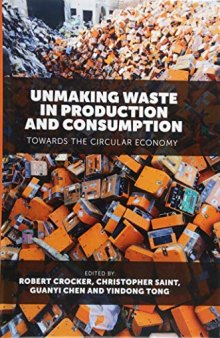 جزییات کتاب
جزییات کتاب
The legacies of a century of fossil-fuel based development and overconsumption, of treating the environment as a waste sink for industry and agriculture, have left devastating impacts on the earth's air, water and land, and these are directly implicated in Climate Change. In response, a number of global institutions and nations, including the European Union and China, have committed themselves to the development of a ‘circular economy'. This will require a transformation of today's ‘linear economy' of ‘make, use and dispose' as the market dictates, into a Circular Economy. The aim of the Circular Economy is to decouple economic growth from resource and energy use through iterative, systemic social, economic and technological reform. This book provides scholars working in the many disciplines that relate to this emerging concept through a cross-disciplinary forum, especially in the areas of First Steps: Theory, Policy and Contexts; Improving Resource Efficiency and Reducing Waste; Changing Consumption and Behaviour by Design; and Transforming Technologies of Production. This book presents new theoretical and practical insights into the circular economy concept, based on case studies from both the developing and developed world, with a considerable emphasis on economic and material localization, circularity and 'symbiosis' (the circulation of resources within an industrial context or domain) and social entrepreneurship and innovation.
 درباره نویسنده
درباره نویسنده
رابرت کراسکر (به انگلیسی: Robert Krasker) فیلمبردار استرالیایی سینمای هالیوود و برنده جایزه اسکار بهترین فیلمبرداری سال ۱۹۵۰



 دانلود کتاب
دانلود کتاب

 جزییات کتاب
جزییات کتاب
 درباره نویسنده
درباره نویسنده





 این کتاب رو مطالعه کردید؟ نظر شما چیست؟
این کتاب رو مطالعه کردید؟ نظر شما چیست؟
